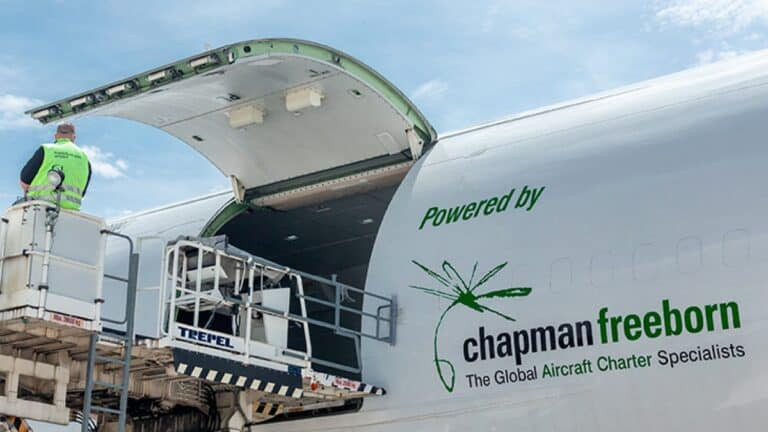With five decades in the business, Chapman Freeborn is looking to use its expertise to provide world-renowned air cargo charter solutions.
Having started in the days where requests and agreements were done through a phone call and a handshake, the company has seen the sector evolve through various iterations, as it moved into the digital era.
As time has passed, increased complexity has seen charter broking companies, including Chapman Freeborn, adapt to become better structured, organised, and compliant with modern business practices.
“The very basics of the air charter broking business – buying from aircraft/airline’s supplier and selling to a customer – has not changed at all. What has changed is the process and everything that is contractually involved,” Russi Batliwala, Chairman of the Board at Chapman Freeborn, explained.
“The broking industry has grown and diversified into other fields, as has Chapman Freeborn, offering services such as animal transportation (Intradco Global), on board courier (Chapman Freeborn OBC) and air cargo management (Magma Aviation),” Catriona Taylor, Group Passenger Operations Director, Chapman Freeborn, said.
“It is simply not enough to only offer an aircraft charter from A to B and to take a commission for offering the solution. Both customers and suppliers today want to see real added value in the broker involvement,” Batliwala added.
Read more: Chapman Freeborn delivers lifesaving aid to Turkey and Syria
Long-term vision
With an evolving business model and an increasingly competitive environment, it’s crucial for companies in the charter broker sector to develop a recipe for success. Whether working with clients or experienced carriers, Chapman Freeborn offers the ability to arrange the delivery of time-critical air cargo, heavy and outsize equipment, humanitarian goods, and all other types of freight.
Quite simply, Batliwala highlights that a major reason for their success is “not being greedy” and focusing on building long-term relationships with clients, suppliers, and their own staff, over prioritising short-term gains.
“Growth has also been key for where we are today. We have successfully diversified from our core charter business with other profitable complementary niche businesses that take away the financial reliance on third-party air chartering and increase our service offering to our customers,” Batliwala said.
One example of this diversification and development is how, today, Chapman Freeborn provides global customers with both a variety of in-house aircraft managed and owned assets, as well as third party aircraft charter solutions.
“Our service level and customer experience has always been second to none, with clients coming back to us year after year, trusting us to carry out their charters to the quality levels they expect. The relationships we hold with our suppliers has also been key, working with airlines around the globe and being a trusted partner of theirs,” Taylor stated.
Entering the digital age
Turning 50 doesn’t mean Chapman Freeborn is set in traditional ways. Quite the contrary, it has embraced technological innovation where it sees opportunities to improve its operations. However, despite the discussion around how technology is shaping the airfreight sector, Batliwala was clear that it is “only as good as the people who are behind the scenes.”
“Technology may find you an aircraft quicker, but it will not help avoid the so many issues and potential problems that aircraft chartering can have. Technology is a good sales pitch and door opener, but the fact is, if behind the scenes there are no experienced charter brokers, it will be difficult to succeed,” Batliwala explained.
That’s why, for Chapman Freeborn, their key focus is, as mentioned, on building relationships, growing their experience, and expanding their knowledge of operational issues. “This I believe is key to a successful air charter operation and that is our focus and our strength globally,” Batliwala added.
Digitalisation has helped with that focus as it allows the company to be constantly connected around the world to its many offices and clients. However, Taylor is clear that you will never be able to beat a face-to-face conversation in the charter broker sector. “We are on a first-name basis with the people we work with, and over the years we have built up strong and personal relationships with clients, suppliers, and partners. This will never change, no matter how much we grow and diversify, or how digital the world becomes,” Taylor stated.
Read more: Chapman Freeborn expands Africa operations as part of ongoing growth in the region
Expansion
As the market changes and grows, so do the companies working within it. Marking the next phase of its ongoing growth plan, Chapman Freeborn recently announced their new international Aircraft, Crew, Maintenance, and Insurance (ACMI) leasing team. This division will seek to help the company thrive in the “feast or famine” charter business, which is always going to be plagued by huge volatility in airfreight demand.
“Growth has always been very important and is ongoing today either organically or through various acquisitions,” Batliwala explained. As part of Avia Solutions Group, Chapman Freeborn has been opened up to a number of new opportunities, with the ACMI division just one such example of potential expansion. “Leasing of all types of aircraft for specific passenger and cargo projects in the short, medium, or long-term is also an area where we believe we can add value and new ideas,” Batliwala added.
“We are looking for growth and diversification in all areas of the business. We have a strong focus on recruitment and are focused on finding amazing aviation talent to join us across all regions; the Americas, Europe, IMEA and APAC,” Taylor said. “Chapman Freeborn is in a phase of growth across all areas of the business, with a particular emphasis on the business aviation sector and also the development of industry verticals such as automotive cargo and humanitarian, to name just two.”



